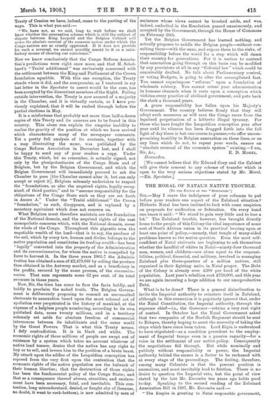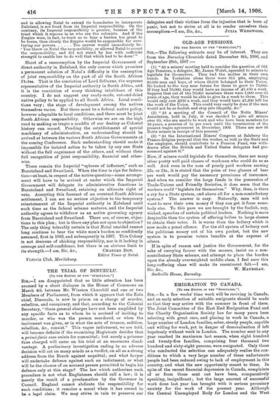THE MORAL OF NATAL'S NATIVE TROUBLE.
[To THE EDITOR OF THE " SPECTATOR.".1 SIR,—May I crave the indulgence of your columns to put before your readers one aspect of the Zululand situation ? Hitherto Natal has been inclined to look with some suspicion on proposals for unification or federation. On every hand one bears it said : " We stand to gain very little and to lose a lot." The Zululand trouble, however, has brought directly home to the people of this Colony the vital importance of some sort of South African union in its practical bearing upon at least one point of policy,—namely, that tangle of many-sided problems known as the native question. Even the most self- confident of Natal stalwarts are beginning to ask themselves whether the handful of whites in Natal—ninety-four thousand men, women, and children—are alone equal to the responsi- bilities, political, financial, and military, involved in managing Zululand plus three-quarters of a million natives, still organised in their fighting units, in Natal proper. The Debt of the Colony is already over £200 per head of the white population. Last year's rebellion cost £750,000, and this year we are again incurring a large addition to our unreproductive Debt.
What is to be done P There is a general disinclination to invite the Imperial authority to reinstate itself in Zululand, although in this connexion it is popularly ignored that, under the Natal Constitution, the Imperial authority, through the supreme chief—i.e., the Governor—retains a very real right of control. In October last the Natal Government asked that two companies of the Norfolk Regiment should be sent to Eshowe, thereby hoping to avert the necessity of taking the steps which have since been taken. Lord Elgin. is understood to have stipulated—as a condition precedent to the employ- ment of Imperial troops even in a passive capacity—for a voice in the settlement of our native policy. Consequently the negotiations fell through. But while nominally and publicly without responsibility or power, the Imperial authority behind the scenes is a factor to be reckoned with at every stage of the proceedings. The feeling, therefore, among many Colonists is that the present position is anomalous, and must inevitably lead to friction. There is no desire to question the Imperial veto, but the point of view stated by the late Mr. Escombe ten years ago holds good to-day. Speaking to the second reading of the Zululand Annexation Bill in 1897, Mr. Escombe said:- " The Empire in granting to Natal responsible government, and in allowing Natal to extend its boundaries to incorporate Zululand, is not freed from its Imperial responsibility. On the contrary, its Imperial responsibility is greater, because of the trust which it reposes in us who are the colonists. And if the Empire were, in fact, to trust us to bear a burden too great to be borne, then clearly the Empire would be responsible for over-
taxing our powers The answer would immediately be : ' You threw on Natal the responsibility, or allowed Natal to accept the responsibility, and did not stand by her with sufficient strength to enable her to do well that which had to be done.' "
Short of a reassumption by the Imperial Gcvernment of direct authority in Zululand, the only course which promises a permanent solution of Natal's difficulty is the assumption of joint responsibility on the part of all the South African States. That is the conviction of Lord Selborne, the supreme representative of the Imperial authority in South Africa, and it is the conviction of every thinking inhabitant of this country. I do not suggest any ready-made, cut-and-dried native policy to be applied to all South Africa. Local condi- tions vary ; the stage of development among the natives themselves varies. But there must be a federal native policy, however adaptable to local conditions, and there must be joint South African responsibility. Otherwise we are on the high road to making as tragic a muddle of our destiny as Colonial history can record. Pending the establishment of special
machinery of administration, an understanding should be arrived at between the various South African Governments at the coming Conference. Such understanding should make it
impossible for isolated action to be taken by any one State without the full cognisance of the others, and without their full recognition of joint responsibility, financial and other- wise.
There remain the Imperial "spheres of influence," such as Basutoland and Swaziland. When the time is ripe for federa- tion—at least, in respect of the native question—some arrange- ment will have to be arrived at under which the Imperial
Government will delegate its administrative functions in Basutoland and Swaziland, retaining an ultimate right of
veto. Accepting this forecast of an eventual South African settlement, I can see no serious objection to the temporary reinstatement of the Imperial authority in Zululand until such time as the federal scheme matures, and the Imperial authority agrees to withdraw as an active governing agency
from Basutoland and Swaziland. There are, of course, objec- tions to this plan ; but is there any plan not open to objection ? The only thing tolerably certain is that Natal unaided cannot long continue to bear the white man's burden so confidently assumed, first in 1893, and subsequently in 1897. This Colony is not desirous of shirking responsibility, nor is it lacking in courage and self-confidence, but there is an obvious limit to Editor Times of Natal.
Victoria Club, Maritzburg.











































 Previous page
Previous page